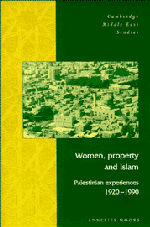Book contents
- Frontmatter
- Contents
- Acknowledgements
- 1 Introduction: women and property
- Part I Politics, economy and kinship
- Part II The dower
- Part III Paid labour and property
- 7 Poverty, wage labour and property
- 8 Gender and garment production
- 9 Education, professional work and property
- 10 Women and property revisited
- References
- Index
8 - Gender and garment production
from Part III - Paid labour and property
Published online by Cambridge University Press: 05 July 2011
- Frontmatter
- Contents
- Acknowledgements
- 1 Introduction: women and property
- Part I Politics, economy and kinship
- Part II The dower
- Part III Paid labour and property
- 7 Poverty, wage labour and property
- 8 Gender and garment production
- 9 Education, professional work and property
- 10 Women and property revisited
- References
- Index
Summary
If many women left agricultural labour and domestic service after the occupation, at the same time the sewing trade has attracted a large number of lower-class West Bank women. These women reject the idea of going to work in Israel, even if they could earn there considerably more. Their labour is, however, directly linked to the Israeli economy, as most West Bank clothing producers have become subcontractors to Israeli firms.
Developments in garment production on the West Bank are reminiscent of the global process of restructuring and relocation. As little capital is needed to set up a workshop, the sector is generally characterised by ease of entry and intense competition, with low labour costs and high flexibility crucial for profitability (Rainnie 1984: 146). Historically, the garment sector has been marked by a division between manufacturers who perform all steps of the production process (from designing to marketing) and ‘outside shops’ sewing ready cut garments received from a jobber and returning the finished product to him (Lamphere 1979: 258). When it became possible to separate designing/marketing and production on a global scale, the most labour intensive parts of the production process were relocated to the South where a more abundant supply of compliant, flexible and low cost labour was at hand (Fröbel et al. 1980; Rhodes et al. 1983; Morokvasic et al. 1986).
- Type
- Chapter
- Information
- Women, Property and IslamPalestinian Experiences, 1920–1990, pp. 190 - 213Publisher: Cambridge University PressPrint publication year: 1996



